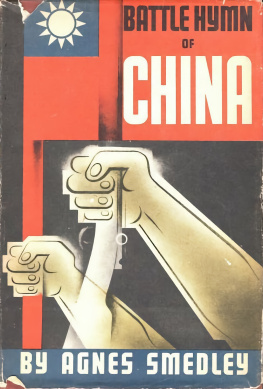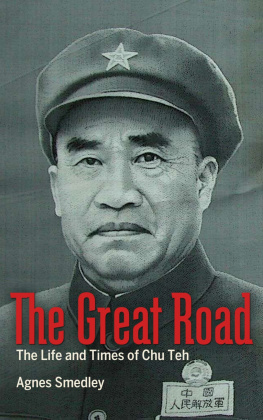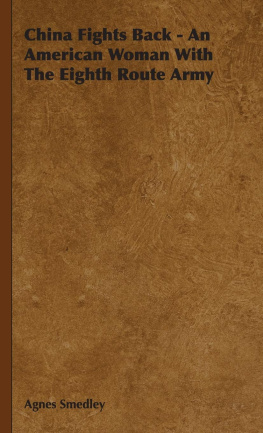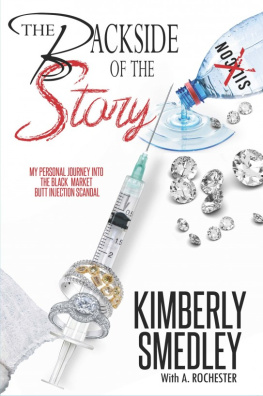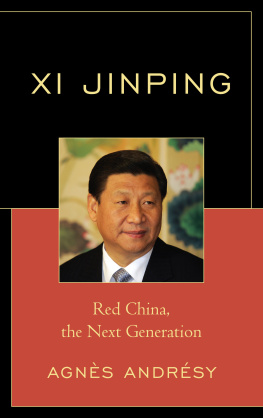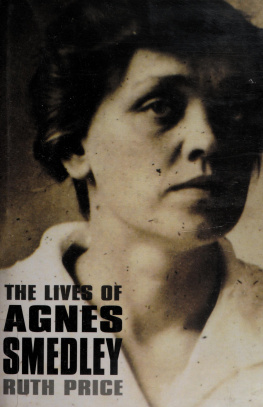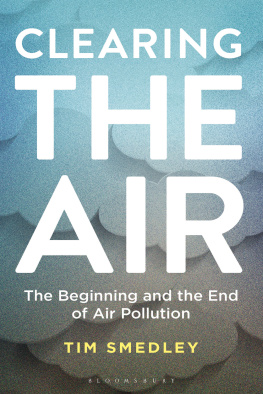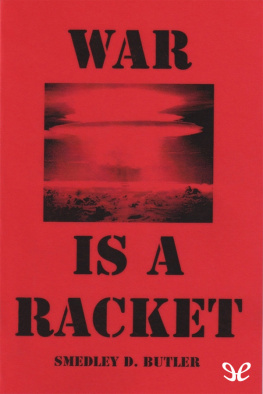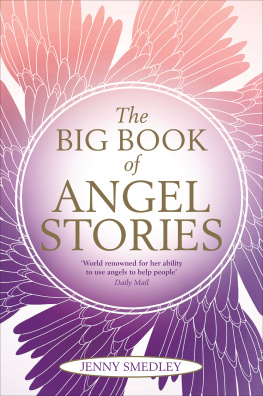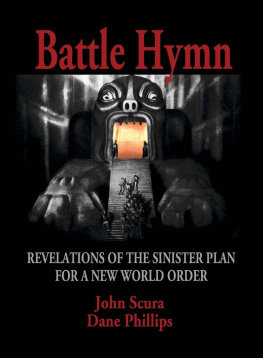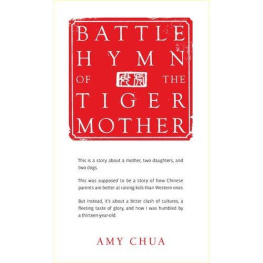Agnes Smedley - Battle Hymn of China
Here you can read online Agnes Smedley - Battle Hymn of China full text of the book (entire story) in english for free. Download pdf and epub, get meaning, cover and reviews about this ebook. year: 1943, publisher: London Victor Gollancz Ltd, genre: Non-fiction. Description of the work, (preface) as well as reviews are available. Best literature library LitArk.com created for fans of good reading and offers a wide selection of genres:
Romance novel
Science fiction
Adventure
Detective
Science
History
Home and family
Prose
Art
Politics
Computer
Non-fiction
Religion
Business
Children
Humor
Choose a favorite category and find really read worthwhile books. Enjoy immersion in the world of imagination, feel the emotions of the characters or learn something new for yourself, make an fascinating discovery.
- Book:Battle Hymn of China
- Author:
- Publisher:London Victor Gollancz Ltd
- Genre:
- Year:1943
- Rating:3 / 5
- Favourites:Add to favourites
- Your mark:
- 60
- 1
- 2
- 3
- 4
- 5
Battle Hymn of China: summary, description and annotation
We offer to read an annotation, description, summary or preface (depends on what the author of the book "Battle Hymn of China" wrote himself). If you haven't found the necessary information about the book — write in the comments, we will try to find it.
Battle Hymn of China — read online for free the complete book (whole text) full work
Below is the text of the book, divided by pages. System saving the place of the last page read, allows you to conveniently read the book "Battle Hymn of China" online for free, without having to search again every time where you left off. Put a bookmark, and you can go to the page where you finished reading at any time.
Font size:
Interval:
Bookmark:
Battle Hymn of China
by
Agnes Smedley
London Victor Gollancz Ltd
1944
Copyright 1943 by Agnes Smedley
epub version 1.0
To
The Soldiers of China
Poor, Glorious Pioneers in the World Struggle
Against Fascism
Glimpses of the Past
There are tales, long whispered in my family, which, if true, explain the two strains that mingled when my father and mother married. One strain my mothers was of a hard-working, gentle, and devout folk. The other consisted of rebels, wanderers, tellers of tall tales, singers of songs.
My father eloped with my mother before she was of age. Her father, John, found them in the home of my fathers sister, Mary. Aunt Mary was a widow with many children, but a woman of unusual capacity and determination. Her eyes fell approvingly on Grandfather John, a frail, gentle man resembling pictures of Jesus Christ. Johns wife was still alive, and, to judge by a faded tin-type, very beautiful. But she died shortly after, following a long illness, and my grandfather married Aunt Mary. In the small, drab villages and isolated farm-houses of northern Missouri little rumours often grew to gargantuan proportions. The gossips specialised most of all in the gruesome, and more than one farm woman was thereafter seen wagging her head and heard talking of the strange things that were supposed to have happened in my grandfathers house of evil widows and poor ailing wives and poison
Finally Grandfather wasted away and died of tuberculosis. Mary cared for him with infinite tenderness, uttering never a harsh word at his endless exactions, warning her many children, and his, to behave as she did. There lingers in my memory a vision of this tall, strong woman, sitting or kneeling by his bedside, engaged in low conversation or silent waiting.
So John had died, said the gossips, shaking their heads knowingly. What else could you expect, when, as everyone knew, he had spent his declining years walking the floor complaining that his first wifes spirit haunted him? As he lay dying, rumour ran, he wanted to cleanse his soul of the sin of poisoning his first wife, but Mary had smothered his confession by placing her hand across his mouth! Anything could be expected of that big woman, who came from God only knew where and could do anything from curing diseases with herbs to managing a big farm and rearing more than a dozen children!
If Aunt Mary had lived in an earlier period, her abilities might have caused her to be burned as a witch. Instead, she was well over ninety before she laid down her corncob pipe for the last time. People said she sped around the country in a Ford until her dying day, her white hair flying, her pipe in her mouth. She was so tall that when she died a special coffin had to be built for her. I have not yet heard just how many men were needed to carry the coffin, but by the time I get around to investigating the story, Im sure the number will be fabulous. Ive heard it said by the gentle branch of our family that Mary is most certainly not taking any back seat in the Hereafter.
All my mothers people died young which, considering their goodness, was only natural. On the other hand, all my fathers people, save one uncle who turned Christian missionary, lived to a ripe old age. The two family strains, meeting in me, made my spirit a battlefield across which a civil war raged endlessly.
When I was very young, my father dragged us from northern Missouri to southern Colorado, where Rockefellers Colorado Fuel & Iron Company owned everything but the air. My father went to this region to make his fortune, but fell victim to a system the fruits of which were poverty, disease, and ignorance for the miners.
We lived a primitive life in the camps, but I now understand that our intellectual poverty was far worse than our physical condition. When I try to recollect the impact of so-called cultural influences, I can recall only Scotch and English folk-songs, cowboy songs, and such ballads as those in praise of Jesse James all of them sung by my father. I do not remember hearing my mother sing; she was too unhappy.
Until I was fifteen years old I knew little of the world beyond that Rockefeller domain of southern Colorado and northern New Mexico. My father did unskilled labour and drank to forget his hopes, and my mother worked intermittently as a wash-woman and a keeper of boarders. We Smedley children there were five of us somehow managed to get to the poor local primary schools. But I never finished grade school and never attended a high school. Most high-school graduates of today inspire no regret in me, but I have always believed that had I had some basic knowledge of science, mathematics, literature, and language, I would have been better equipped to meet life. I have long felt that the poverty and ignorance of my youth were the tribute which I, like millions of others, paid to private interests.
The schools my brothers and sisters and I attended were perhaps no more boring than most. However, my thinking was not to be disciplined, and not all the kings horses and all the kings men could teach me grammar or arithmetic. Even in later years my efforts to learn languages ended in dismal failure, although in the case of German I managed to absorb what I needed or whatever sounded beautiful or powerful. If I disliked a person, my mind closed and I could learn nothing from him. So I took from schools and from life what I found interesting, not what people thought good for me. But my mother and a red-haired woman schoolteacher in Tercio, a mining camp, must have regarded me with hope, for they kept urging me to get an education. Education seemed to consist in reading many books, but just which I did not know. For years I groped, reading anything between covers, often understanding hardly a sentence, but believing mystically that the key to knowledge lay buried in words. My reading covered everything from trashy romance to a ghastly book on school law and one called Behaviourist Psychology.
The nearest I ever came to the classics was a large volume of something called poetry. Because it was printed on very thin paper, it quite naturally hung from a string in a privy. A man by the name of Shakespeare seemed to have written it, but I could make neither head nor tail of it. In later years I often read of men who received their first noble impulses from contacts with great minds; I was in my early twenties before I learned who Shakespeare was, and in my forties before I read his plays. In the mining camps he had made no impression whatsoever, and I returned the volume of thin paper to its nail on the privy wall.
I disliked so many things in life and received so many humiliations from rich little girls that my teachers used to keep me after school and lecture me on the bourgeois virtues. It was in vain. I fought boys with jimson weeds and rocks, and nothing could make a little lady of me. When I was nine my mother put me out to work washing dishes and caring for squawling babies. I was later promoted to stripping tobacco leaves in a cigar store, but I dawdled so much over my work that I was fired. One employer told me that I was a bad worker because I read too many books. Heres your wages for the week, and you neednt come back, he said. He gave me two dollars and a half. For years after that I did all kinds of unskilled labour.
Religion is sometimes considered a cultural influence. What I have known of it has made me content that I was not carefully trained in its principles. The virtue of submission to injustice, of rendering unto Caesar that which Caesar did not produce himself, made no impression on me. Beyond that, the belief in immortality has always seemed cowardly to me. When very young I learned that all things die, and all that we wish of good must be won on this earth or not at all.
Next pageFont size:
Interval:
Bookmark:
Similar books «Battle Hymn of China»
Look at similar books to Battle Hymn of China. We have selected literature similar in name and meaning in the hope of providing readers with more options to find new, interesting, not yet read works.
Discussion, reviews of the book Battle Hymn of China and just readers' own opinions. Leave your comments, write what you think about the work, its meaning or the main characters. Specify what exactly you liked and what you didn't like, and why you think so.

